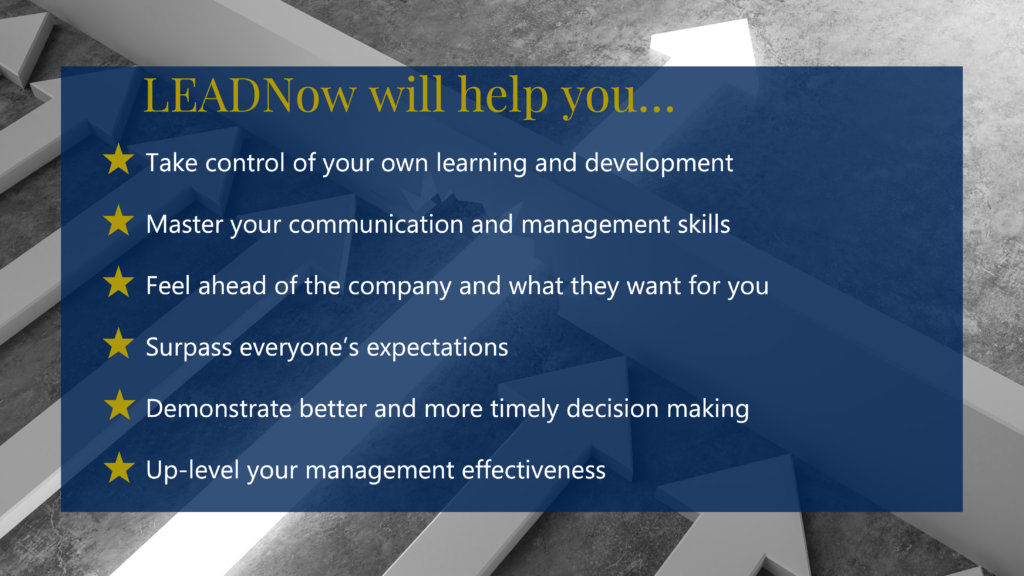On-Demand Learning
ELEVATE YOUR LEADERSHIP QUALITIES AS AN ENTREPRENEUR, MANAGER OR BUSINESS LEADER

Invest in Yourself & Team
We recognize the real obstacles you face and have created on-demand courses to help you solve these problems and succeed.
Boost your confidence
Make More Money
Feel happier and in control of your life and career
Standard Features
All of our courses offer these features and more.
BOOKMARK
Access your courses any time, from anywhere on Earth. These are resources to which you can always refer.
MENTORSHIP
We're huge believers in the mentor protégé relationship. We're here to help guide you on your journey.
WHENEVER WHEREVER
Study at your own pace and from wherever you'd like. LEADNow is always at your fingertips and is designed to be revisited.
E-LEARNING EXPERTS
We're veteran operators, experienced leaders, world-class coaches and life-long learners. We guide you through growth and change.
VIBRANT COMMUNITY
With 400+ clients (teams, companies and individuals) we've been doing this since 1997. You're in good company.
ALWAYS INNOVATING
Our instruction is in a constant state of evolution. Your learning isn't static, it evolves with you throughout your career and beyond.
Up-Level Your Skills
Feel confident that you and your employees can deliver on goals and expectations
An incredible learning experience
24/7 access from anywhere, on any device.
Our instructors are all highly experienced coaches and consultants.
This would normally cost thousands of dollars for on-site in-person instruction from our world-class facilitators.

Make the Smart Choice & Get the Essentials Bundle

What Our Clients Say



Core Leadership Qualities Defined
What are the Most Important Leadership Qualities?
Although there are many leadership qualities that are important for a manager to possess, some qualities are more essential than others. The most important leadership qualities include the ability to delegate, the ability to motivate, and the ability to inspire.
The ability to delegate is essential for a leader because it allows them to focus on the most important tasks while delegating less important tasks to other members of their team. A leader who is able to delegate effectively will be able to get more done and will be less likely to become overwhelmed.
The ability to motivate is also an important leadership quality because it allows a leader to keep their team focused and working towards common goals. A leader who is unable to motivate their team is likely to see high levels of turnover and may even struggle to retain employees.
Finally, the ability to inspire is one of the most important leadership qualities because it allows a leader to instill in their team a sense of purpose and dedication. A leader who cannot inspire their team is likely to see low morale and may even find it difficult to retain emplovees.
What is Professional Development?
Professional development is essential for businesses and individuals alike, as it helps to nurture professional growth and personal growth. For organizations, professional development can lead to improvements in efficiency and productivity, as employees are equipped with the tools and knowledge they need to tackle challenges head-on. Additionally, professional development fosters collaboration among employees by expanding their networks and granting them access to new perspectives and skillsets. In this way, professional development ultimately benefits organizations by helping them stay ahead of the competition and stay adaptive in a changing business landscape.
What is Servant Leadership?
In today’s fast-paced business environment, success often hinges on the ability of companies to stay abreast of trends and changes in the market.
One key way to accomplish this is through professional development practices that encourage professional growth and innovation among employees. However, professional development alone will not guarantee success; successful organizations also tend to have a strong focus on servant leadership practices. By emphasizing a culture of service and problem-solving over self-promotion or individual achievement, these organizations are able to create an environment in which employees can freely collaborate, share ideas, and innovate without fear of reprisal or judgment. Whether in the form of open communication channels or team-focused incentives, these servant leadership practices are critical for fostering professional growth and cultivating a positive working environment that is conducive to achieving business outcomes. After all, strong leadership is essential for successful professional development – as well as for ensuring lasting organizational success.
What is Growth Mindset
Having a growth mindset is an important tool for all kinds of businesses, but especially for small businesses that are just starting out. By cultivating a mindset of professional development, these companies are better able to take on new challenges and adapt to the constantly changing business landscape. A growth mindset also fosters an innovative spirit, encouraging employees to constantly seek out new opportunities and find creative ways to improve their work processes. This leads to greater innovation within the company as a whole and allows small businesses to stay ahead of their competitors. Ultimately, having a growth mindset is essential for the long-term success of any small business, and it is something that every entrepreneur should strive to cultivate in themselves and their teams.
What is Executive Coaching?
Executive coaching has become increasingly popular as a means of promoting business success. While the concept of coaching is not new, the use of coaches to help executives develop and implement effective strategies is relatively recent. However, there is growing evidence that executive coaching can have a positive impact on business outcomes. Studies have shown that businesses who invest in coaching for their executives experience higher levels of profitability and productivity than those who do not. In addition, coaching can help to develop better team dynamics and improve communication between employees. Given the growing body of evidence, it is clear that executive coaching can be a valuable tool for promoting positive business outcomes.
Some key benefits of emotional intelligence in business include improved communication, more effective collaboration among team members, better decision-making abilities, and the ability to handle stressors more effectively. Ultimately, these are all essential factors that contribute to business success and good leadership outcomes. And while some people may be naturally more emotionally intelligent than others, any executive or manager can enhance their abilities through practice and training. So whether you’re just starting out in your career or you’ve been leading teams for years, cultivating your emotional intelligence is sure to have a positive impact on your professional life.
WE’VE BEEN COACHING LEADERS FOR OVER 25 YEARS.




















